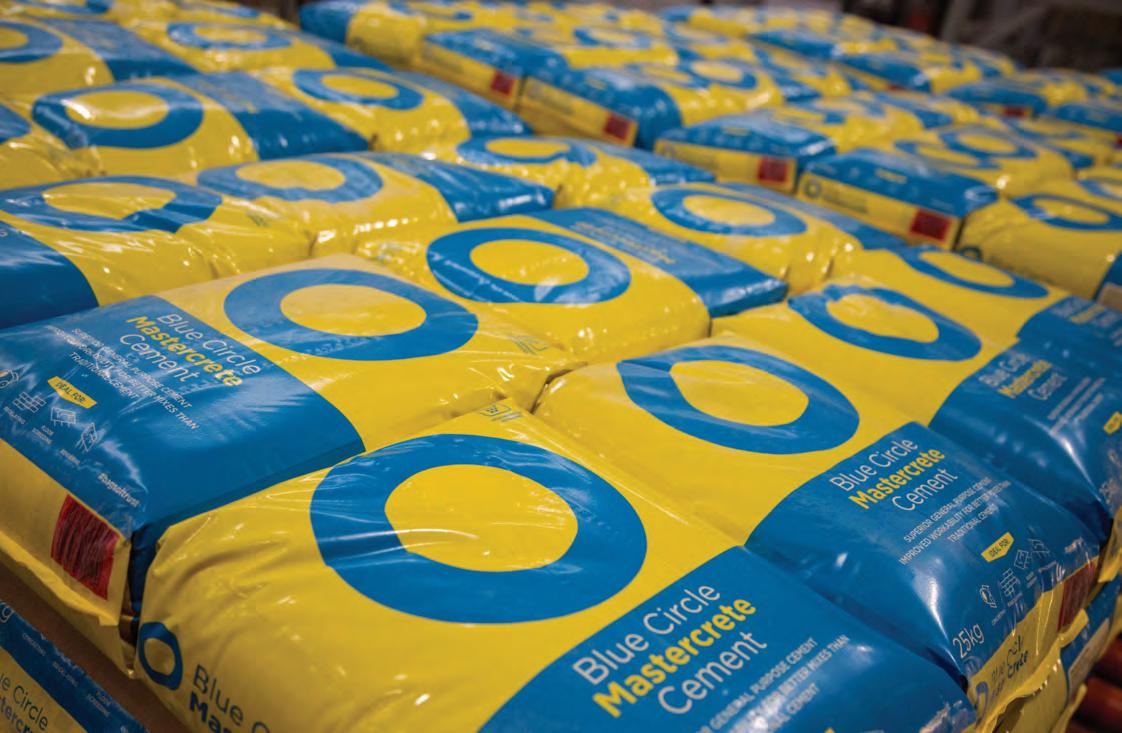
3 minute read
BRICKS, BLOCKS & HARD LANDSCAPING
leading initiatives and pilot schemes.
In 2022, for instance, Tarmac took part in a pioneering fuel-swap trial, funded by the Department for Business, Energy and Industrial Strategy (BEIS), which explored the potential of using plasma energy and hydrogen technology (as opposed to natural gas) to enable lower carbon production of cement and lime. In addition to this, we have also been exploring the use of hydrogen as an alternative to natural gas for lime manufacturing.
However, the product itself is only one way to drive sustainability and it is important to help our customers understand our solutions and their attributes throughout the whole life cycle. From packaging to transport, Tarmac is driving innovation in product delivery to support sustainability throughout entire projects.
Driving progress
Packaging is one area in which great strides continue to be made to improve the sustainability credentials of construction materials. For example, Tarmac was the first supplier in the UK to use 50% recycled plastics for our bagged products.

Industry-wide initiatives are also driving performance, including The Pallet Loop scheme, under which manufacturers pay a deposit for distinctively branded 100% FSC green pallets, which are engineered to last and used to transport products to construction sites. As pallets move through the supply chain, the deposit passes from manufacturer to merchant to end user.
Once used, stacked and stored, the scheme operator collects the pallets and returns deposits, before repairing pallets as necessary and recirculating them.
Figures from The Pallet Loop show that the construction sector currently needs to cut down more than 6,000 acres of forestry each year to support the single-use pallet model, which is estimated to make up 10% of the construction waste stream. We’re proud to have signed the charter for this initiative and by committing to a closed loop model, sustainable suppliers like Tarmac can help make a real difference throughout the sector.
Low carbon transport
Another important consideration is how products are transported throughout the supply chain and one of Tarmac’s key sustainability goals is to be at the forefront of implementing low CO2 transport and logistics solutions. With more than 60 railconnected sites nationwide, we are one of the country’s biggest users of the rail freight network; this resulted in more than 22,500 HGV lorries being taken off the road last year. It’s a significant step towards a lower carbon-built environment. n For more information on Tarmac’s range of products and support services for merchants, enter the shortcode www.rdr.link/mas021
What’s more, Tarmac’s rail freight capabilities are part of a balanced logistics portfolio which includes trialling and adopting the latest vehicle technologies such as the first battery electric concrete mixer truck in the UK. The new 26-tonne electric truck uses 100% of its site electricity from renewable energy sources.
The final consideration lies in the fundamental need to reduce our impact on primary resources. Tarmac is a net user of waste, which means we use more of other people’s waste than the waste we produce ourselves. Key to this is designing out waste at every stage of the product life cycle and developing products with greater durability, performance and longevity to help support a circular economy. As part of our 2030 sustainability strategy, our ultimate goal is to recycle and use over 70 million tonnes of waste from other industries in our processes and products by 2030.
In summary, the key for merchants is to work with suppliers who can provide a holistic, end-to-end sustainability solution across all aspects. And to educate their own customers in the merits of such sustainable efforts. Only then will we be able to unlock the commercial, societal and operational benefits of a more sustainable construction industry.
Mannok Lower Carbon Cement Production
Mannok and FLSmidth are celebrating the successful implementation of the FUELFLEX® Pyrolyzer, a new combustion system which is said to have “almost eliminated” the use of fossil fuel in the most carbon intensive stage of cement production at Mannok’s plant, reducing 240 tonnes of carbon emissions per day, whilst significantly reducing NOx emissions.

FLSmidth, the Danish engineering company which created the new technology, first partnered with Mannok on the world’s first pilot of the technology back in 2018. To mark this significant milestone in the completion of this international R&D project, which is “set to transform the cement manufacturing industry” and is helping Mannok’s cement production be more sustainable, the two companies recently held a major launch event with politicians, stakeholders, industry experts, government agencies, local councils and schools from the Republic of Ireland, the UK and Denmark attending.
The technology has operated successfully at the Irish producer’s facilities since July 2022 and has already enabled Mannok to cut its fossil fuel use in the cement production process. Indeed, the new system has allowed the manufacturer to replace 90% of its coal use with SRF (solid recovered fuels), which would otherwise go to landfill, in the pre-calcination stage of cement production and it is working towards eliminating the use of coal.

n For more information, and to see a video explainer of the new system, enter www.rdr.link/mas022










